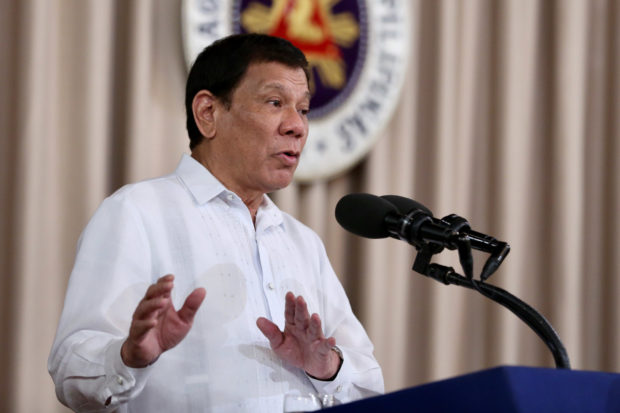
President Rodrigo Duterte. Photo by ACE MORANDANTE / Presidential Photographers Division
President Duterte has admitted authorizing the wiretapping of at least two mayors whom he accused of being “narcopoliticians.”
Mr. Duterte made the admission in Marawi City while talking about Iloilo Mayor Jed Patrick Mabilog and Ozamiz City Mayor Reynaldo Parojinog, whom he accused of being protectors of drug lords.
The President clarified that he never said Mabilog was manufacturing “shabu” but the Iloilo mayor was “protector No. 1” of those in the shabu trade.
Mr. Duterte said Mabilog is currently “out of the country because he’s afraid [of suffering] the same fate [as] Parojinog.”
Parojinog and 14 other people were killed in a police raid on his home in July.
“But Parojinog [was] different. At least there is a semblance of an authority. He was a protector, but maybe also part of the gambling syndicate,” the President said.
“I am not sure on that score. But I [made] sure whenever he was talking to anyone, I was listening to him,” he said.
‘Whisper from God’
“Don’t ask me how… It was a whisper from God and I was listening to him. So they were all tapped,” he admitted. “I was the one who ordered it.”
Mr. Duterte did not say if he secured a court order nor did he identify whom he ordered to conduct the wiretapping, which is generally prohibited under Republic Act No. 4200, or the antiwiretapping law.
Under RA 4200, enacted in 1965, prohibits the tapping of any wire or cable or using other devices to record, intercept, or secretly overhear any private communication or spoken word in violation of the constitutional right to privacy of communication.
Wiretapping allowed
But the law allowed wiretapping in some specific situations so long as it is authorized by a court of law.
When reporters asked presidential spokesperson Ernesto Abella whether Mr. Duterte obtained a court order for the wiretapping, Abella said the President would have made sure his actions were legal.
“I’m sure that being a lawyer, he was operating within bounds of legality,” Abella said in a press briefing.